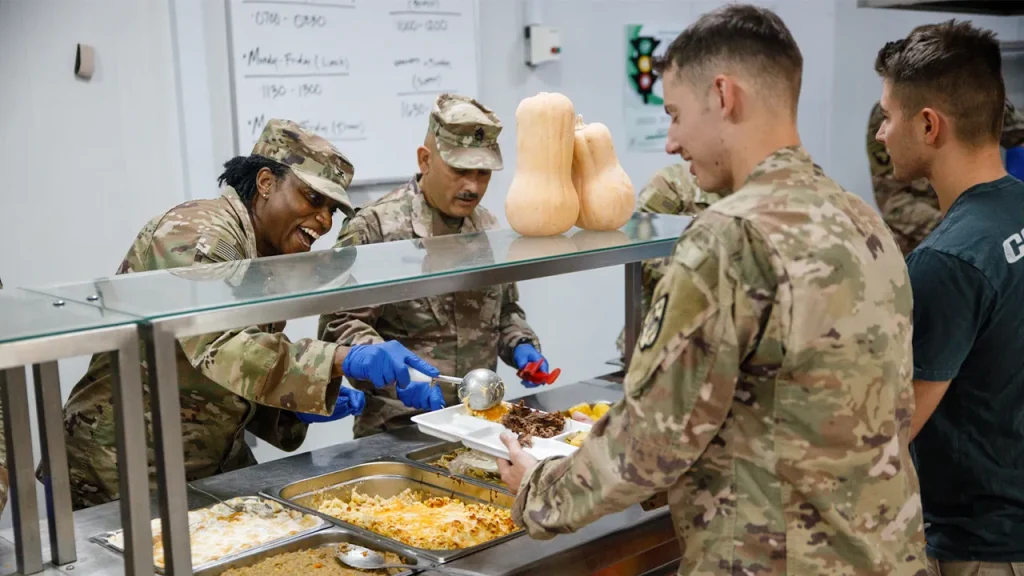A Military Thanksgiving: Serving Those Who Serve
For American servicemembers stationed around the globe, being away from home during the holidays can be particularly challenging. This Thanksgiving, however, the Defense Logistics Agency’s (DLA) Troop Support Subsistence team has worked tirelessly to ensure that troops everywhere can enjoy a taste of home. In one of their largest annual operations, the DLA has secured more than 380,000 pounds of traditional Thanksgiving food to be distributed to military dining facilities worldwide. This massive undertaking represents not just logistical expertise, but a heartfelt commitment to supporting the morale and well-being of those who serve our nation far from their families during the holiday season.
The scale of this year’s Thanksgiving provisions is remarkable, with military dining facilities receiving over 152,000 pounds of turkey, 124,000 pounds of beef, 66,000 pounds of ham, and 38,000 pounds of shrimp. The holiday spread doesn’t end with the main course—troops will also enjoy over 6,500 cans of sweet potato, more than 15,000 cases of pies and cakes, and nearly 800 cases of eggnog. These impressive numbers represent more than just food; they symbolize the connection between servicemembers and the traditions they cherish. As families across America gather around tables laden with similar dishes, our military personnel can participate in this shared cultural experience despite being thousands of miles from home. This communal breaking of bread, even across great distances, maintains an important thread of connection between those serving and the country they protect.
“Holiday requirements are like fingerprints in that no two are alike,” explains John Sheehan, TSS director of customer operations. This apt comparison highlights the complexity behind what might seem like a straightforward task. The planning process must account for fluctuating troop numbers and locations, varying preferences, and the logistical challenges of delivering perishable items to remote and sometimes dangerous locations around the world. Each year brings different requirements, with the “ebb and flow of one holiday item to the next” being determined by the ever-changing landscape of military deployments. What remains constant, however, is the commitment to ensuring that no servicemember misses out on this important tradition, regardless of where duty has taken them.
The impact of these holiday meals extends far beyond simple nutrition. Army Chief Warrant Officer 4 Shemika Harris, a TSS military food advisor, expressed being “absolutely impressed” by the DLA’s dedication, noting that the team approaches “each holiday with a sense of pride and purpose knowing that these meals mean far more than just food.” Indeed, in military service, food often carries emotional and psychological significance that civilians might not fully appreciate. A traditional Thanksgiving meal in a forward operating base or on a naval vessel at sea can momentarily transport servicemembers back home, boost morale during difficult assignments, and reinforce the bonds between those serving together. In environments where comfort is scarce and danger may be present, these familiar tastes and shared experiences provide valuable psychological support.
Recognition of the troops’ service comes from the highest levels of leadership as well. Secretary of War Pete Hegseth personally reached out to servicemembers worldwide this week, calling to express Thanksgiving wishes and gratitude for their service. During one call where video capability was unavailable, Hegseth displayed the kind of humor that resonates with military personnel, joking that in his “mind’s eye” the captain was “a staggeringly handsome individual, as are all two dozen of the incredible sailors behind you.” This human touch from leadership, combined with the efforts to provide holiday meals, demonstrates an understanding that maintaining morale requires both practical support and personal connection. It acknowledges that those in uniform are not just military assets but individuals with emotional needs and connections to home.
First Lady Melania Trump and Usha Vance also participated in the tradition of honoring military service during the holiday season, making a joint visit to troops’ families. This gesture recognizes that military service affects not just those in uniform but their entire families, who make their own sacrifices throughout the year. As Americans gather around their Thanksgiving tables this year, many will include moments of gratitude for those unable to be with their own families due to their commitment to service. The extensive effort to provide these holiday meals serves as a reminder of the continued presence of American servicemembers worldwide, standing watch while the nation celebrates. Through turkey, stuffing, and pumpkin pie, the country extends a taste of home and a message of appreciation to those whose duty takes them far from their own tables this Thanksgiving season.


